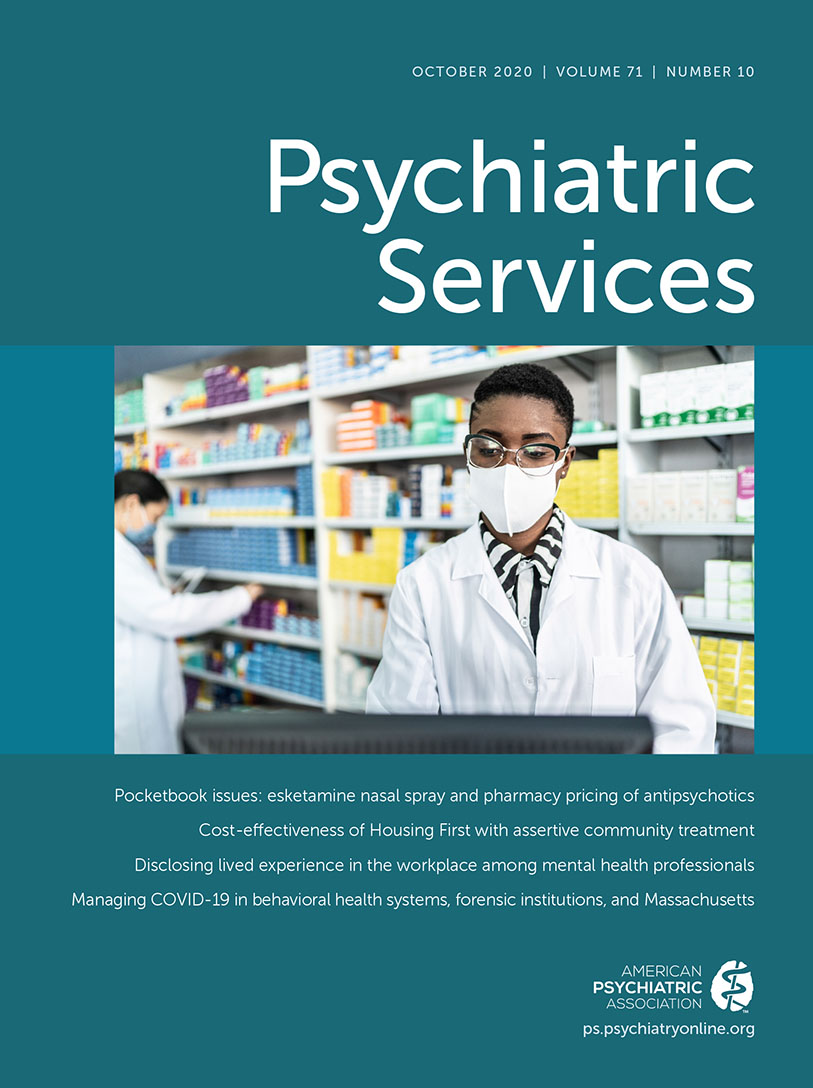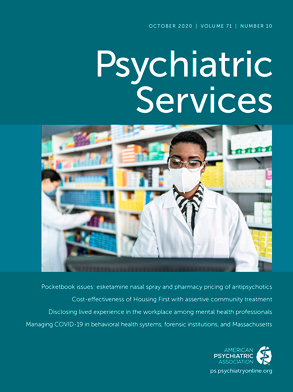The term “individual placement and support” (IPS) refers to the evidence-based practice of supported employment for people with serious mental disorders (e.g., schizophrenia, bipolar disorder, and depression). The story of IPS is unique. Few evidence-based interventions have spread across the United States for decades, few have been sustained over time, and even fewer have been adopted by other countries. This Open Forum tells the story of how this was achieved.
An evidence-based practice such as IPS goes through several implementation phases. The early phases of IPS have been described elsewhere (
1–
3). The final phases, dissemination and sustainment, refer respectively to the spread and maintenance of these programs within organizations (
4). IPS began to move from university-affiliated sites into other community mental health centers in the early 2000s, starting with a handful of programs. By 2016, more than 500 IPS programs existed in 38 states (
5), and we estimate that in 2020 at least 1,000 IPS programs, including those used in the Veterans Health Administration, are active in the United States. Meanwhile, IPS demonstration projects began in other countries during the 2000s, and IPS programs are now available in at least 19 countries (Australia, Belgium, Canada, China, Czech Republic, Denmark, France, Germany, Iceland, Ireland, Italy, Japan, Netherlands, New Zealand, Norway, Spain, Sweden, Switzerland, and the United Kingdom) (
6). In some nations, IPS is spreading extensively. For example, the National Health Service plans to implement IPS throughout the United Kingdom (
https://www.england.nhs.uk/mental-health/taskforce/imp/mh-dashboard).
IPS programs have survived and prospered despite changes in local leadership, shifting priorities, budget cuts, lack of a clear funding stream, and other externalities. A 2014 study of 129 IPS programs in 13 U.S. states found that 96% were sustained across a 2-year period, with most maintaining good program fidelity (
7), a sharp contrast to the usual discontinuation or slippage of program quality after initial grant funding ends (
8). Moreover, quality indicators also improved, suggesting that the activities described below fostered quality as well as sustainment. We believe that a conjunction of four factors explains the success of IPS.
A Client-Centered Approach
Most people with serious mental disorders want to work—a desire that motivated the early clubhouse and psychosocial rehabilitation movements during the era of deinstitutionalization. Although professionals at that time created numerous prevocational approaches, clients expressed discontent with pre-employment experiences and indicated a desire for autonomous decision making regarding timing, job choice, hours of work, type of support, and other aspects of employment.
In the late 1980s, one of the current authors [D.R.B.], in collaboration with clients and peer-support experts, developed IPS supported employment specifically for people with serious mental illness (
9). The IPS model approached employment directly, eschewing pre-employment testing, training, and practice in sheltered settings. The IPS specialist learns what kind of job the client prefers and has the skills to do, helps the client to find such a job through a targeted job search, and provides support as needed to maintain employment for as long as the client wishes. Since its early development, the cofounders [R.E.D. and D.R.B.], Sarah Swanson, and a network of IPS supervisors and specialists, peers, and trainers have continued to refine the IPS approach, producing a series of regularly updated manuals (
https://ipsworks.org). The principles of IPS embody client choice. The client’s wish for employment is the only entrance criterion. The IPS specialist and mental health team, in accordance with the client’s wishes, facilitate a rapid search to find a preferred job by using a targeted job development method. The client also chooses the amount and type of ongoing job support.
Research
After initiation of the IPS program in the Dartmouth Psychiatric Research Center, two of the current authors [R.E.D. and G.R.B.] and many other researchers conducted studies (funded by several federal agencies) to compare the IPS approach with those of other vocational models, address program fidelity with different populations and settings, and study longitudinal outcomes to examine effectiveness of the approach and its principles (
10). The benefits of IPS and its core principles held up under a wide range of conditions. IPS was effective with diverse populations (
11), such as minority groups and people who were homeless, in both urban and rural settings, and over many years (
12). Furthermore, adherence to IPS principles (fidelity) correlated strongly with employment outcomes (
13). For example, although many vocational experts insisted on separating clinical and vocational services, integration of these services was more effective.
Thus, when program leaders, state directors, and federal officials embraced the evidence-based practice movement in the early 2000s (
14), IPS stood out as the only vocational intervention for people with serious mental disorders that had strong empirical support—a status that remains true today, as systematic reviews and meta-analyses have concluded (
15). Moreover, IPS has never been static, but instead has changed as new research has appeared.
Foundation and Federal Support
Dissemination of IPS received a boost in the early 2000s when private foundations began to contact the Dartmouth Psychiatric Research Center staff about promoting more widespread implementation. In 2001, Johnson and Johnson (J&J) Corporate Contributions (which is independent of the more than 100 J&J companies) began funding pilot IPS projects in Connecticut, South Carolina, and Vermont and subsequently expanded funding to enable several states to implement IPS more broadly under the auspices of the J&J–Dartmouth Community Mental Health Program (
1). J&J funded each of these states for 3 years, requiring matching funding from the states’ departments of mental health and vocational rehabilitation, to help establish an infrastructure to implement IPS programs in community mental health centers.
In addition, J&J funded national programs in three other countries (Italy, the Netherlands, and Spain) to engage in a similar implementation process. When J&J discontinued funding, 14 U.S. states and three countries were actively implementing IPS with their own trainers and reviewers. As mentioned above, the IPS program has spread steadily since then.
Also during the early 2000s, the Robert Wood Johnson Foundation contacted Dartmouth Center staff to study the implementation of an array of evidence-based practices, including IPS supported employment, in community mental health centers. The Substance Abuse and Mental Health Services Administration soon joined the effort and expanded the project, leading to a series of articles in
Psychiatric Services and to several successful implementation studies across eight states and more than 50 mental health centers in the early 2000s (
16). Federal legislation, including flexible Medicaid rules and waivers and judicial actions under the Americans With Disabilities Act of 1990 (
17), also fostered the expansion of IPS.
IPS Learning Community
Starting in 2001, the Dartmouth Psychiatric Research Center—now called the IPS Employment Center—convened annual meetings for state leaders participating in the J&J–Dartmouth Community Mental Health Program. State leaders agreed to form a structured learning community that was based on implementation theories, learning collaborative models, and the Dartmouth Medical School’s experience in coordinating several learning cooperatives in health care. The international IPS learning community continues to spearhead the spread, quality, and sustainment of IPS (
2).
Membership in the IPS learning community requires that states or regions have a working relationship between mental health and vocational rehabilitation agencies at the state or regional level, a funding plan to implement and sustain IPS, and the interest of local providers. The learning community has two tiers: the IPS Employment Center partners with state or regional leaders to plan, implement, and monitor IPS programs, and the states or regions (such as Alameda County in California) set up and monitor similar communities within their states or regions. IPS Employment Center consultants collaborate with state and regional leaders to plan a stepwise expansion of programs (rapid and broad expansions are rarely effective because of attenuated resources). At the state or local level, coequal liaisons from mental health and vocational rehabilitation agencies oversee all IPS programs and hire trainers and fidelity reviewers to lead program implementation and monitor its quality. States or regions start with one trainer and one fidelity reviewer and add personnel as programs spread.
To assist with IPS implementation at new sites, the IPS Employment Center provides educational materials, online training, and initial supervision and support to state and regional trainers and technical assistance as needed (
https://ipsworks.org). The learning community provides a network of colleagues across states and regions through which different stakeholder groups can meet to solve problems. For example, IPS specialists throughout the United States worked together to interview employers to develop strategies that help clients with previous felonies find jobs. Several working groups simultaneously address different challenges.
The IPS Employment Center provides a Web-based tracking system into which all participating programs enter quarterly data regarding employment services and outcomes. The Center analyzes the data and sends tables and graphs back to states or regions automatically, allowing them to compare programs within and across localities. The Center also arranges an annual 2-day meeting of the international IPS learning community, at a different U.S. location each year, to convene state, consumer, and family leaders; host speakers; provide research updates; and share information and experiences in breakout sessions. U.S. states and other countries, in turn, create their own conferences modeled on the international learning community’s annual meeting. Finally, the IPS Employment Center starts new funded research each year, with opportunities for participation by IPS learning community members.
Conclusions
The story of IPS supported employment involves some serendipity (i.e., foundation support) but also fundamental lessons regarding sustainability that may be useful for the implementation of other programs. To survive over time, evidence-based practices require clear guidelines and fidelity tools, rigorous research-based improvements, excellent leadership, structural support, and alignment with the goals of people for whom they are intended. They also need reliable funding, the lack of which may explain the limited penetration of IPS across the United States despite the continuing growth of states, regions, and programs in the learning community (
5).

